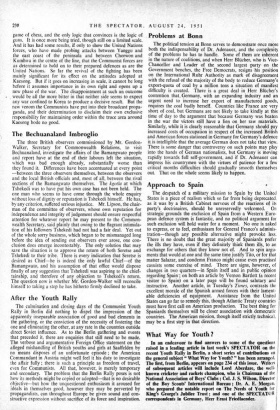. Problems at Bonn
The political tension at Bonn serves to demonstrate once more both the indispensability of Dr. Adenauer, and the complexity of the problems he has to handle. Some of them are inherent in the nature of coalitions, and when Herr Blucher, who is Vice- Chancellor and- Leader of the second largest party on the Government benches, the Free Democrats, resigns his position on the International Ruhr Authority as mark of disagreement with the refusal of the majority of the body to reduce Germany's export-quota of coal by a million tons a situation of manifest difficulty is created. There is a great deal in Herr Blucher's contention that. Germany, with an expanding industry and an urgent need to increase her export of manufactured goods, requires the coal badly herself. Countries like France are very short of coal, but Germans are not likely to take kindly at this time of day to the argument that because Germany was beaten in the war the victors still have a lien on her raw materials. Similarly, while it is clearly reasonable that Germany should pay increased costs of occupation in respect of the increased British and American forces stationed in Germany for Germany's defence it. is intelligible that the average German does not take that view. There is some danger that controversy on such points may play into the hands of German nationalists, but Germany is moving rapidly towards full self-government, and if Dr. Adenauer can impress his countrymen with the virtues of patience for a few critical months difficulties should gradually smooth themselves out. That on the whole seems likely to happen.






























 Previous page
Previous page